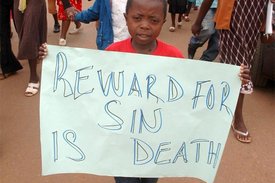At a Congressional committee hearing last week on Uganda’s controversial Anti-Homosexuality Bill, several witnesses urged President Obama to speak out against the measure, a sentiment already proffered earlier last week by dozens of Congressmembers.
The Tom Lantos Human Rights Commission heard testimony from a series of experts on African affairs and human-rights issues, all of whom enumerated the damaging consequences of the bill and offered recommendations for its defeat.
“If President Obama and the First Lady can engage more with our first family, I think that would be very, very helpful,” testified the Rev. Kapya Kaoma, a Zambian priest and project director of Political Research Associates.
The White House issued a statement last month that said the president was opposed to the Anti-Homosexuality Bill, but Obama has yet to make a personal statement about the measure, which was introduced by Ugandan lawmaker David Bahati in October. Bahati’s bill would allow for life imprisonment for those who have consensual same-sex relations, the death penalty for sexually active HIV-positive individuals and imprisonment for up to three years for those who do not turn in LGBTs to police.
Ninety members of the U.S. House of Representatives sent a letter to Obama on Jan. 21, applauding his statement as well as remarks made by Secretary of State Hillary Clinton, but stating they “strongly believe that the severity of this legislation requires that you do more,” noting that a similar initiative has also recently been undertaken in Rwanda.
“We ask you to demonstrate your personal leadership, and that of our country, in seeking to deter these legislative proposals that would legalize hate in countries with which we have bilateral partnerships,” the letter read.
The lawmakers urged Obama to speak out publicly against the measure, as well as to advocate for the decriminalization of homosexuality throughout the world and formulate a response should the bills in Uganda or Rwanda succeed.
Local U.S. Reps. Bob Brady (D-1st Dist.), Joe Sestak (D-7th Dist.) and Mike Doyle (D-14th Dist.) signed on to the letter.
A series of witnesses offered personal and professional testimony on the Uganda bill during the Jan. 22 hearing.
Julius Kaggwa, of Uganda’s Civil Society Coalition on Human Rights and Constitutional Law, testified about his own experiences with anti-LGBT sentiments in his country, describing how he was fired from his job and had his house set on fire when his orientation became public. Kaggwa said the number of anti-LGBT attacks has already begun to rise since the bill’s introduction, adding he’s confident its passage would “heighten the legislative and social harassment and persecution” of LGBT individuals.
Christine Lubinski, director of the Infectious Diseases Society of America’s Center for Global Health Policy, spoke to the panel of legislators about the potential consequences the measure could have on the country’s efforts to fight HIV/AIDS. She noted that Uganda, which has an HIV rate five times that of the United States, previously demonstrated “serious, high-level political leadership, a willingness to engage in straight talk about HIV-risk reduction and to mount a concerted condom-distribution campaign,” efforts she said could be fruitless if the legislation succeeds and continues to stigmatize the disease.
More than 1,500 staffers at IDSA and the HIV Medicine Association signed on to a letter to Ugandan President Yoweri Museveni condemning the legislation.
Last week, a dozen members of the U.S. Senate penned their own memo to Museveni, saying the passage of the measure would be a “glaring setback in Uganda’s human-rights standing.”
“We understand you have recently raised concerns over the legislation and urge you to do everything within your power to block its advancement,” the senators wrote.
Museveni recently cautioned the Ugandan Parliament to “go slow” on the bill, noting that it is a “foreign-policy issue.”
Local U.S. Sens. Arlen Specter (D) and Bob Casey (D) did not sign the letter.
Deputy Assistant Secretary Karl Wycoff, with the State Department’s Bureau of African Affairs, said during the hearing that the United States has been “very active” in relaying its disapproval of the bill to Ugandan leaders, but noted the administration wants to proceed cautiously so as not to break down relations between the two countries and possibly help propel the legislation forward.
“Our interest is to be as effective as we can in ensuring this legislation doesn’t go anywhere,” Wycoff said. “We’re trying to calibrate what our approach is. We don’t want to do things that would be counterproductive.”
Lubinski said the United States should not cut off funding for HIV/AIDS programs in Uganda, as they function as “too much of a day-to-day lifeline for too many people. It seems like there’s significant other avenues to pursue.”
Cary Alan Johnson, executive director of the International Gay and Lesbian Human Rights Commission, testified that Obama should take advantage of his reputation in Africa to enlist the support of countries surrounding Uganda in fighting against the bill.
“President Obama’s stature in Africa is unparalleled,” Johnson said. “His voice carries great weight.”
Jen Colletta can be reached at [email protected].

